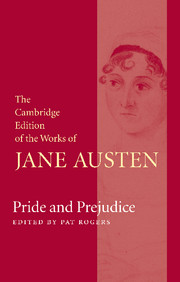Book contents
- Frontmatter
- Contents
- General Editor’s Preface
- Acknowledgements
- Chronology
- Introduction
- Note on the Text
- Pride and Prejudice
- Pride and Prejudice: Volume I
- Pride and Prejudice: Volume II
- Pride and Prejudice: Volume III
- Corrections and Emendations to 1813 text
- Appendix 1 Thomas Egerton and the Publication History
- Appendix 2 Legal and Military Background
- Appendix 3 Pemberley and its Models
- Appendix 4 Note on the second and third editions of Pride and Prejudice
- Abbreviations
- Explanatory Notes
Chapter 3
Published online by Cambridge University Press: 19 December 2020
- Frontmatter
- Contents
- General Editor’s Preface
- Acknowledgements
- Chronology
- Introduction
- Note on the Text
- Pride and Prejudice
- Pride and Prejudice: Volume I
- Pride and Prejudice: Volume II
- Pride and Prejudice: Volume III
- Corrections and Emendations to 1813 text
- Appendix 1 Thomas Egerton and the Publication History
- Appendix 2 Legal and Military Background
- Appendix 3 Pemberley and its Models
- Appendix 4 Note on the second and third editions of Pride and Prejudice
- Abbreviations
- Explanatory Notes
Summary
MRS. GARDINERS caution to Elizabeth was punctually and kindly given on the first favourable opportunity of speaking to her alone; after honestly telling her what she thought, she thus went on:
“You are too sensible a girl, Lizzy, to fall in love merely because you are warned against it; and, therefore, I am not afraid of speaking openly. Seriously, I would have you be on your guard. Do not involve yourself, or endeavour to involve him in an affection which the want of fortune would make so very imprudent. I have nothing to say against him; he is a most interesting young man; and if he had the fortune he ought to have, I should think you could not do better. But as it is—you must not let your fancy run away with you. You have sense, and we all expect you to use it. Your father would depend on your resolution and good conduct, I am sure. You must not disappoint your father.”
“My dear aunt, this is being serious indeed.”
“Yes, and I hope to engage you to be serious likewise.”
“Well, then, you need not be under any alarm. I will take care of myself, and of Mr. Wickham too. He shall not be in love with me, if I can prevent it.”
“Elizabeth, you are not serious now.”
“I beg your pardon. I will try again. At present I am not in love with Mr. Wickham; no, I certainly am not. But he is, beyond all comparison, the most agreeable man I ever saw—and if he becomes really attached to me—I believe it will be better that he should not. I see the imprudence of it.—Oh! that abominable Mr. Darcy!—My father's opinion of me does me the greatest honor; and I should be miserable to forfeit it. My father, however, is partial to Mr. Wickham. In short, my dear aunt, I should be very sorry to be the means of making any of you unhappy; but since we see every day that where there is affection, young people are seldom withheld by immediate want of fortune, from entering into engagements with each other, how can I promise to be wiser than so many of my fellow-creatures if I am tempted, or how am I even to know that it would be wisdom to resist?
- Type
- Chapter
- Information
- Pride and Prejudice , pp. 163 - 170Publisher: Cambridge University PressPrint publication year: 2006

